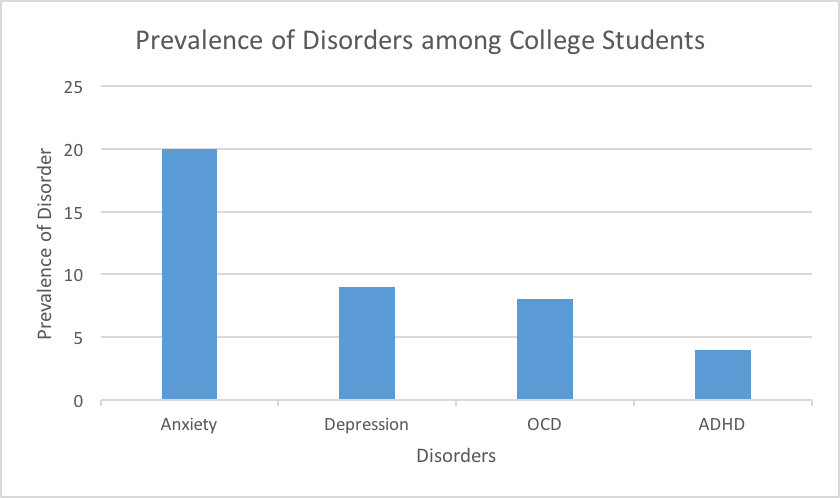Which Mental Disorders are Affecting College Students the Most?
Jessica Radigan and Kayla Rivas
December 7, 2017
We are going to be focusing on disorders such as anxiety, depression, and ADHD which are most common in college students. In order to do so, we have examined data and statistics involving demographics. Below, our graphs indicate the commonality of these disorders throughout gender, race, religion, and age. The figures show that not only are these illnesses very common in college students, but they narrow it down to an even closer look on which college students they may affect more. In addition to these graphs, we have created a graph which shows our results from a survey conducted including 29 college students, where they stated which disorders they have experienced. After gaining this understanding, it makes looking at *how* these students are affected much clearer, because it shows just how common the disorders are and how they are preventing students from gaining the full college experience.
Demographics
Depression and AnxietyAccording to the NSDUH surveys, 8.4 percent of full-time college students experienced depression in the past year. The results differed by demographics such as gender, race, and religion. The bar graph represents the percentage of students who were interviewed in this survey and stated that they had depression. For example, 12% of female college students reported a diagnosis of depression. According to another survey done by Jihan Saber Raja Mahmoud, Ruth Staten, Lynne Hall & Terry Lennie, sophomore college students seemed most affected by depression in relation to other-aged students.
The graph below contains combined data from NSDUH surveys from 2008 to 2010. They surveyed people aged 18-22 both in college and out of college in a random sample.
The survey conducted below is a cross-sectional survey collected in 2007 at a large southeastern public university. 1,700 full-time undergraduate students age 18-24 were randomly selected. The response rate was 32% of this, at 508 students.
Note: The graphs above are mutually exclusive. Graph #1 lists females, males, Hispanics, and Asians; however, this does not mean gender interfered with race or race interfered with gender when collecting this data. Graph #2 includes class level and religion, but that does not mean the class-levels were or were not religious and vise versa.
Effect on College Students
Anxiety and DepressionAnxiety and depression affect college students for an assortment of reasons. For instance, anxiety may affect social interactions or participating in the classroom. Depression may affect motivation to do well or maintaining a healthy sleep schedule.
"Social anxiety disorder is one of the most prevalent types of anxiety. That can be prevalent in a college campus in terms of students’ anxiety about social interactions, being evaluated, what people are going to think of them. In college, you are meeting new people for the first time. Students are having to contribute to discussion in class which is nerve wracking, especially if you have thoughts that other people are smarter than you and you will not know what you’re talking about.”
—Professor Herres
According to Issues in Mental Health Nursing, the transition into college, including the development of independence and self- sufficiency, as well developing and maintaining intimate relationships, is considered stress-arousing and anxiety-provoking (Meadows, Brown, & Elder, 2006; Zirkel, 1992; Zirkel & Cantor, 1990). Though students may come into college with pre-diagnosed anxiety, that does not mean it cannot manifest during the rough transition into a new lifestyle and affect the ability to smoothly get themselves situated.
Anxiety affects performance in the classroom because students may avoid something that would make them uncomfortable. Professor Herres stated that "one of the most common symptoms of anxiety is avoidance. Students may refuse to volunteer in class or do an oral presentation even though it is worth 10-20% of their grade. They just take the bad grade because they cannot do it." Associate Chair in Psychology at TCNJ, Doctor Margaret Ruddy said, "it's troubling how many students are dropping out because of these problems (anxiety and depression). There was one student of mine who took a semester off, and upon her return she was unable to resume her studies because her anxiety was so incapacitating." Dr. Ruddy further added that "every day becomes a burden for anyone suffering from these issues."
Students may also be unable to maintain relationships and perform daily activities because of their depression. According to a survey completed by SAMHSA, 8.2% of full-time college students reported that they experienced severe impairment in their ability to maintain close relationships. 10.0 percent of full-time college students with depression reported that there were over 60 days in the past year where they were unable to carry out normal activities. Only 30.7 percent of full-time college students reported there were no days in the past year when they were totally unable to carry out their normal activities. This low percentage indicates that depression affects all aspects of college--school work, social interaction, and other daily activities necessary to maintain a positive college experience.
When asked about her depression and anxiety, college student, Lauren, admitted that they affected her college experience so much she was put on probation.
"Anxiety caused me to stop going to classes. Then I failed them and my GPA went lower than should have. I was on probation for a semester. Social situations activated my anxiety, which added to the struggle of making friends or hanging out with new people. Anxiety definitely came on stronger through college." Lauren is proof that anxiety and depression affect all areas of the college experience, including GPA and social involvement. "In college, I got really depressed because I was stressed about where to go with my life and didn't want spend money for no reason. So I dropped out and transferred to a cheaper community college." Her disorders had gotten so bad, that she was unable to continue attending her "away" college.
According to Cognitive and Behavioral Practice, ADHD was once considered a disorder of childhood, but is now seen as a chronic developmental disorder that remains in adolescence and adulthood for 50%–80% of individuals diagnosed as children. College students who just recently graduated from high school must adjust from the structured environment at home with parental supervision to the less-structured college environment. In addition, Doctor Ruddy said, "about 5-7% of college students suffer from ADHD and its associated symptoms." Dr. Ruddy continued on in saying, "the interaction between genetic vulnerability and stress, particularly in the environment, is the worst combination in the sense that college is pretty stressful. These stresses trigger those vulnerable to depression."
Unfortunately, Cognitive and Behavioral Practice states that adults with ADHD experience academic and occupational impairment and ultimately achieve lower levels of educational attainment and lower socioeconomic status. The article suggests this might have something to do with their poorer occupational, social, and adaptive functioning.
Cognitive and Behavioral Practice also shows that high school students with ADHD enter college at increasingly higher rates—approximately 4% of college students have an existing diagnosis of ADHD. This is surprising because ADHD used to be considered a childhood disorder that disappeared before adolescence. Another survey represented in Cognitive and Behavioral Practice showed that 30% of the ADHD sample overall were currently in pursuit of a 4-year degree (so, attended college).





Leave a comment
You must be logged in to post a comment.